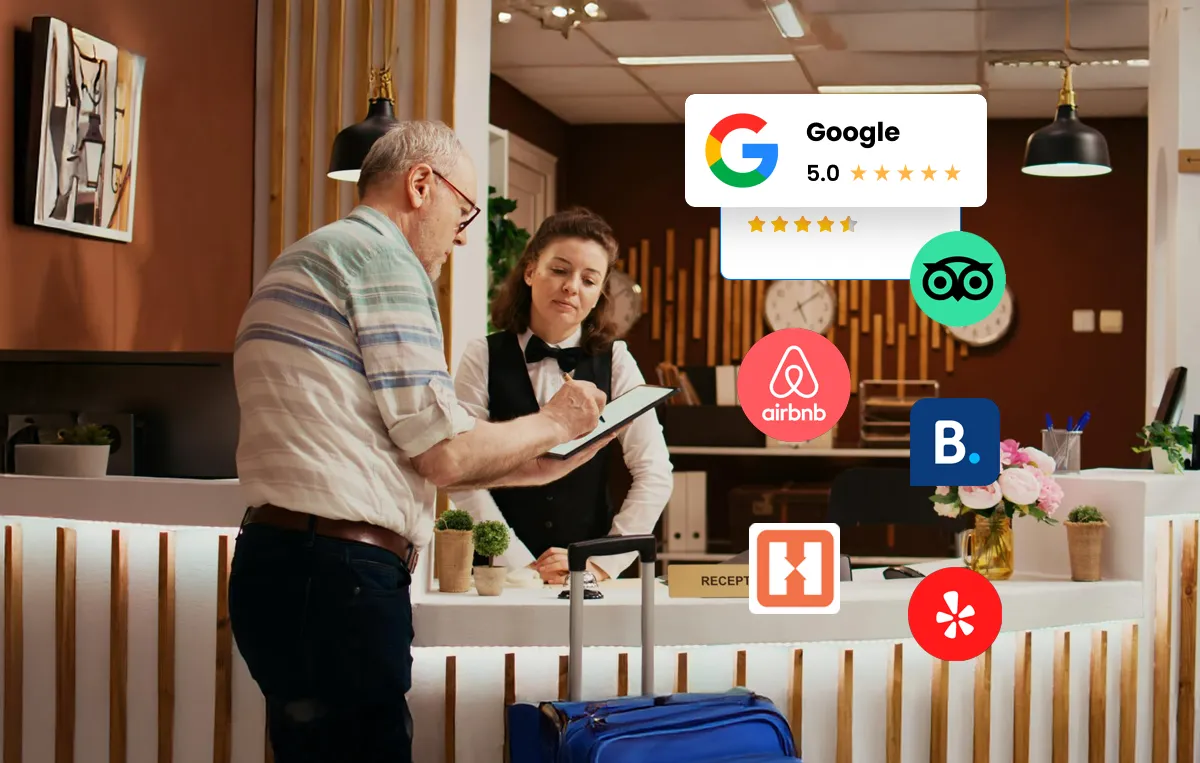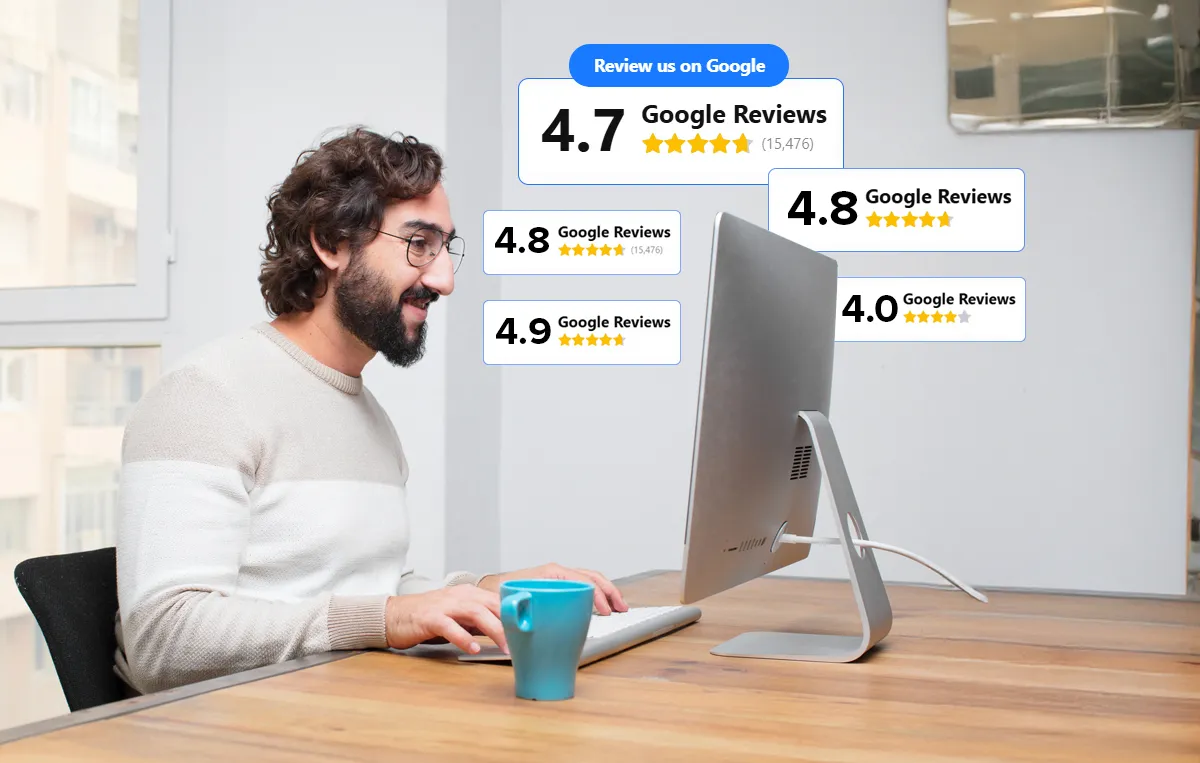When did you last book a hotel without checking reviews?
Whether it’s a luxury stay in New York, a B&B in California, or a guesthouse in Florida, online reviews help people make the right choice.
In fact, 79% of people trust reviews just as much as personal recommendations.
If you’re a hotel or resort owner, you know how much influence reviews have. A single great review can lead to more bookings, while a bad one, if not addressed properly, can hurt your reputation and empty your rooms.
In this blog, we’ll walk you through the best hotel review sites to focus on in 2025. So, you can increase the hotel’s online visibility, attract more guests, and build a strong, positive reputation that keeps people coming back.
Why Online Reviews Matter for Hostels, Resorts, and Other Accommodation Businesses?
Online reviews are a trust signal that directly influences bookings. Travelers rely on real guest experiences to decide where to stay, making reviews just as important as your pricing or location.
A strong review profile builds credibility, increases conversion rate, and keeps you ahead of the competition.
Reasons why listing on top hotel review sites is crucial for any accommodation business:
1. Build Trust & Credibility
As said, first impression is the last impression. Having positive, genuine customer reviews helps a hotel build trust with potential guests.
Trust is the key to any successful hotel business, it’s become even more crucial when 90% of reservations take place online without physically visiting.
When individuals read good reviews from actual visitors, they feel confident while making a booking with you. It’s a stamp of approval from fellow travelers, and it means a lot.
2. Boost Your Bookings & Revenue
The better your reviews, the higher your chances of getting noticed. Reviews directly influence bookings, with higher ratings leading to more interest.
A positive review can make the difference between a last-minute booking and an empty room. And more bookings indeed mean more revenue!
3. Improve Your SEO & Visibility
Want to rank more prominently in search results? Here’s a small secret: reviews improve your SEO. The greater the number of reviews, the higher you’ll rank on Google and other hotel review websites where people can book.
That means when possible guests are looking for places to stay in your vicinity, you’ll be more visible at the top.
The higher number of reviews and ratings you accumulate, the more you will be seen, and the simpler it will be for travelers to find you.
4. Learn From Feedback & Improve Your Service
More than mere praise or complaints, online reviews are an invaluable source of opinion. Reviewing guests tend to offer feedback on places where you could be better, whether that’s in regards to cleanliness, staff performance, or facilities.
By addressing these recommendations, you can upgrade your services and make sure that subsequent guests have an even better experience.
5. Handle Negative Reviews With Care
Though no one likes negative reviews, they’re part of the reality of this industry. The important thing is how you react to them. Answering negative comments with dignity and compassion demonstrates potential visitors that you’re concerned about their stay and that you’re dedicated to enhancing it.
It’s also a way to convert an angry guest into a faithful one. Don’t be afraid, then, of criticism—let it be an opportunity to learn and improve.
Top 15+ Hotel Review Sites for Reliable Ratings & Feedback
Choosing the right review platforms can make a huge difference in your property’s visibility and bookings.
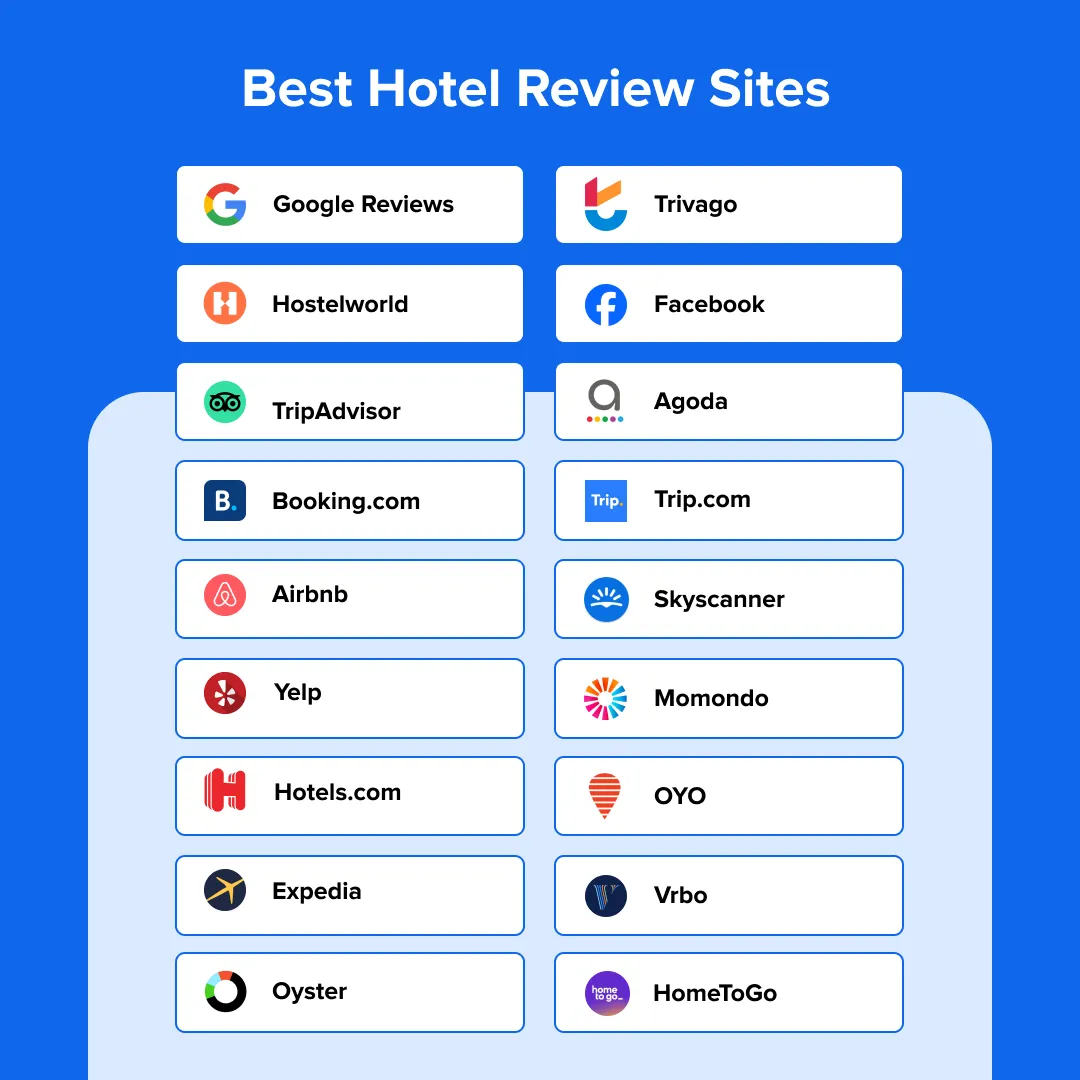
Here are the top hotel review sites that travelers trust for genuine feedback and ratings.
1. Google Reviews: A Must for Local & International Guests
If there’s one review platform you can’t ignore, it’s Google Reviews (GBP). When travelers search for hotels, Google shows ratings right in the search results and on Google Maps, making it the first place potential guests check.
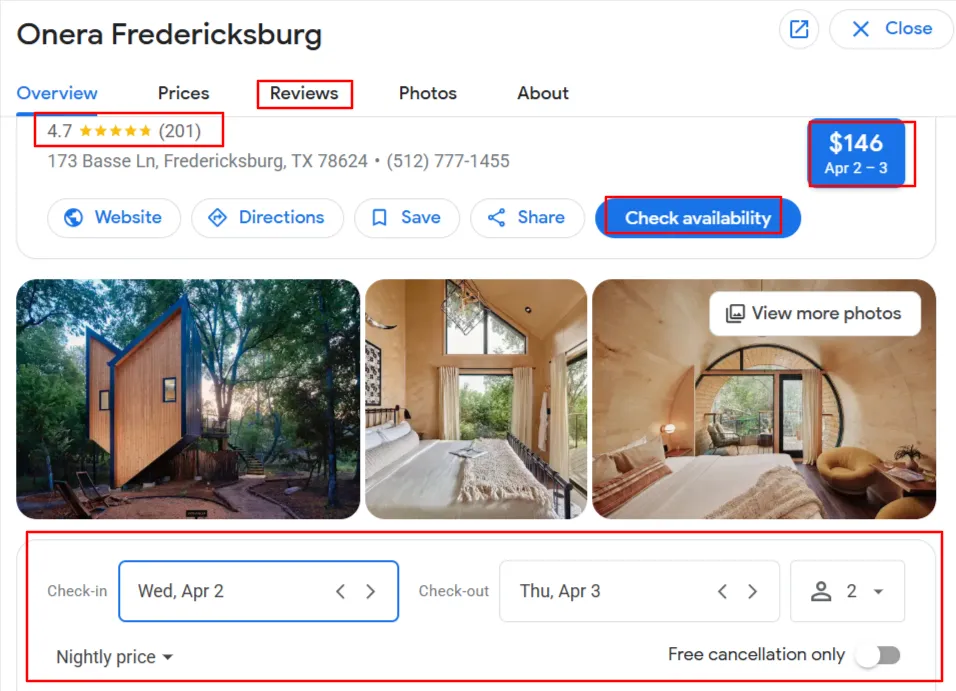
Unique Features
- Integrated with Google Search & Maps: Guests see your reviews instantly.
- Free to Use: No listing fees or paid subscriptions.
- Free UGC for Marketing: GBP is the best platform, featuring a review section that can be leveraged for marketing reviews across various funnels.
- Google Q&A Section: Potential guests can ask questions, and you (or past guests) can respond.
- AI-Powered Summaries: Google highlights key review themes like “great service” or “clean room
- Niche Features: Enable direct booking, menu posting, and hotel website linking to drive direct traffic.
Pros
- Maximum visibility: Shows up in Google Search & Maps, boosting reach.
- Trusted by travelers: Most people check Google first for reviews.
- Boosts local SEO: More positive reviews can improve your search ranking.
- Easy management: You can respond to guest feedback directly and show a reply as a response from the owner.
Cons
- No control over negative reviews: Anyone can leave feedback, even non-guests.
- Fake/spam reviews: Some reviews may be misleading or unfair.
- Slow review removal process: Removing negative or fake reviews on Google can take time, averaging 1 to 2 weeks.
2. Hostelworld: The Go-To Site for Backpackers & Budget Travelers
If your accommodation is for budget travelers and backpackers, Hostelworld is a must-listed hotel review site for you. It is focused on hostels, guesthouses, and shared rooms, so it is the best option for young and solo travelers seeking cheap accommodations.
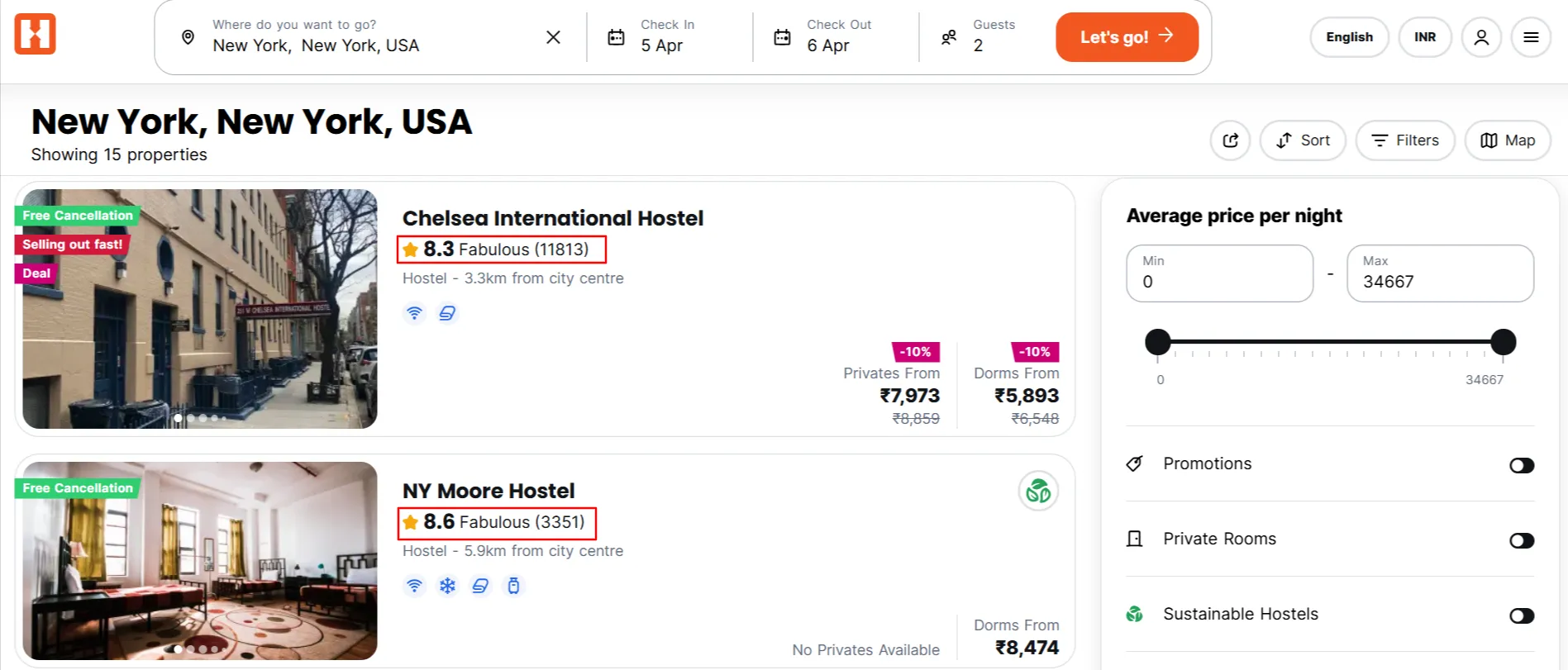
Unique Features
- Designed for hostels: Focuses on shared stays, dorms, and budget-friendly properties.
- Detailed traveler profiles: Guests can create profiles, helping hosts understand their audience.
- Secure booking system: Ensures verified stays and reduces last-minute cancellations.
- Community-driven ratings: Reviewers often share detailed experiences about social atmosphere, cleanliness, and staff.
Pros
- Strong presence in Europe & the USA: Popular among international backpackers.
- Higher ratings get more bookings: A well-rated hostel can see a big boost in reservations.
- Great for niche marketing: Attracts solo travelers and budget tourists directly.
Cons
- Not ideal for hotels or resorts: Primarily caters to hostels and budget accommodations.
- Commission-based model: Charges fees for bookings made through the platform.
- Highly competitive: Need strong reviews to stand out among similar properties.
3. TripAdvisor: The Largest Travel Review Platform
With more than 1 billion user feedback and reviews spanning 8.6 million listings—including hotels, restaurants, and tourist attractions—TripAdvisor is the largest travel review site in the world.
Approximately 463 million travelers visit it every month, making it an important channel for hospitality organizations seeking to gain more visibility and credibility.
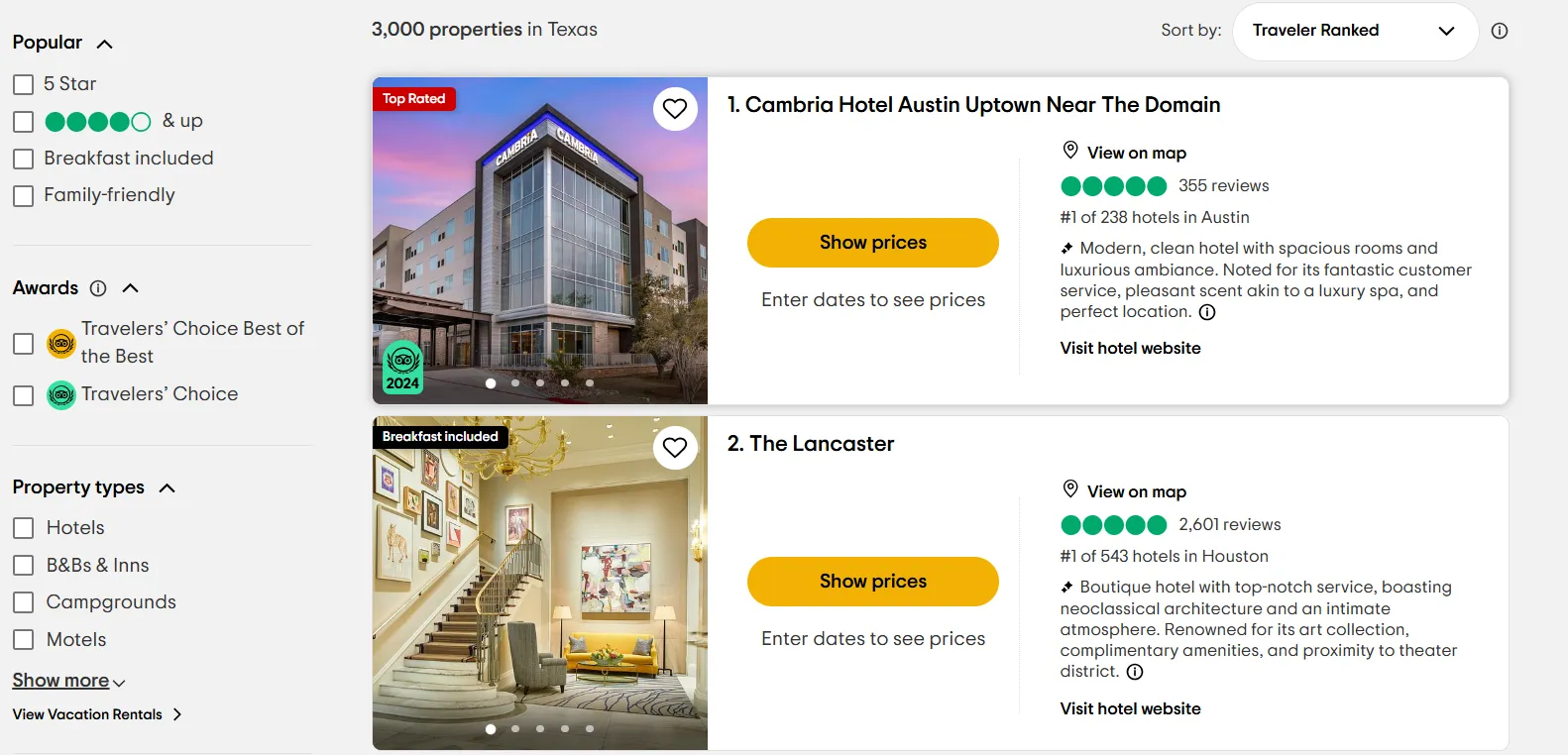
Unique Features
- Massive global audience: One of the most visited travel review platforms.
- Verified reviews & traveler photos: Guests share real experiences, making reviews more credible.
- Management responses: Hotels can publicly reply to reviews to build trust.
- Traveler ranking system: Higher ratings improve visibility in search results.
Pros
- Strong reputation & trust factor: Millions of travelers use it for booking decisions.
- Great for marketing: High ratings can significantly boost bookings.
- Detailed guest feedback: Reviews cover multiple aspects, like cleanliness, service, and location.
- Hosts can respond to reviews: A good response strategy can improve credibility.
Cons
- Anyone can leave reviews: Even non-guests may post feedback.
- Paid features for better visibility: Some tools require a premium business listing.
- Highly competitive: Standing out among similar properties requires strong ratings.
4. Booking.com: Verified Reviews from Real Guests
Booking.com is an online hotel marketplace leader that provides a wide array of accommodations globally. One uniqueness is its dedication to hosting only verified guest reviews so that opinions are solely from guests who have finished their stay.

Unique Features
- Verified Guest Reviews: Only guests who have booked and stayed at the property via Booking.com are able to leave reviews, adding to trustworthiness.
- Comprehensive Accommodation Options: From hotels and apartments to hostels and specialty stays, to suit a wide range of traveler tastes.
- Genius Loyalty Program: Provides discounts and benefits to regular users to encourage return bookings.
- Multilingual Support: Serves a worldwide audience with content in more than one language.
Pros
- Extensive Global Reach: Access to a wide audience, increasing potential bookings.
- Free Listing: Properties can be listed without upfront costs; commission is paid per booking..
- User-Friendly Interface: Simplifies the booking process for guests, enhancing the user experience.
Cons
- Commission Fees: Properties pay a commission on each booking, impacting profit margins.
- Limited Control Over Reviews: While reviews are verified, properties cannot remove negative feedback, which remains publicly visible.
- Customer Service Challenges: Some users report difficulties in resolving issues through customer support.
5. Airbnb: A Review Site for Rental Stays
Airbnb has revolutionized the hospitality industry by connecting hosts and offering unique spaces to travelers seeking personalized experiences.
With over 7.7 million active listings across 220+ countries and regions, and having served over 1.5 billion guests since its inception, Airbnb stands as a dominant force in the alternative accommodations market.
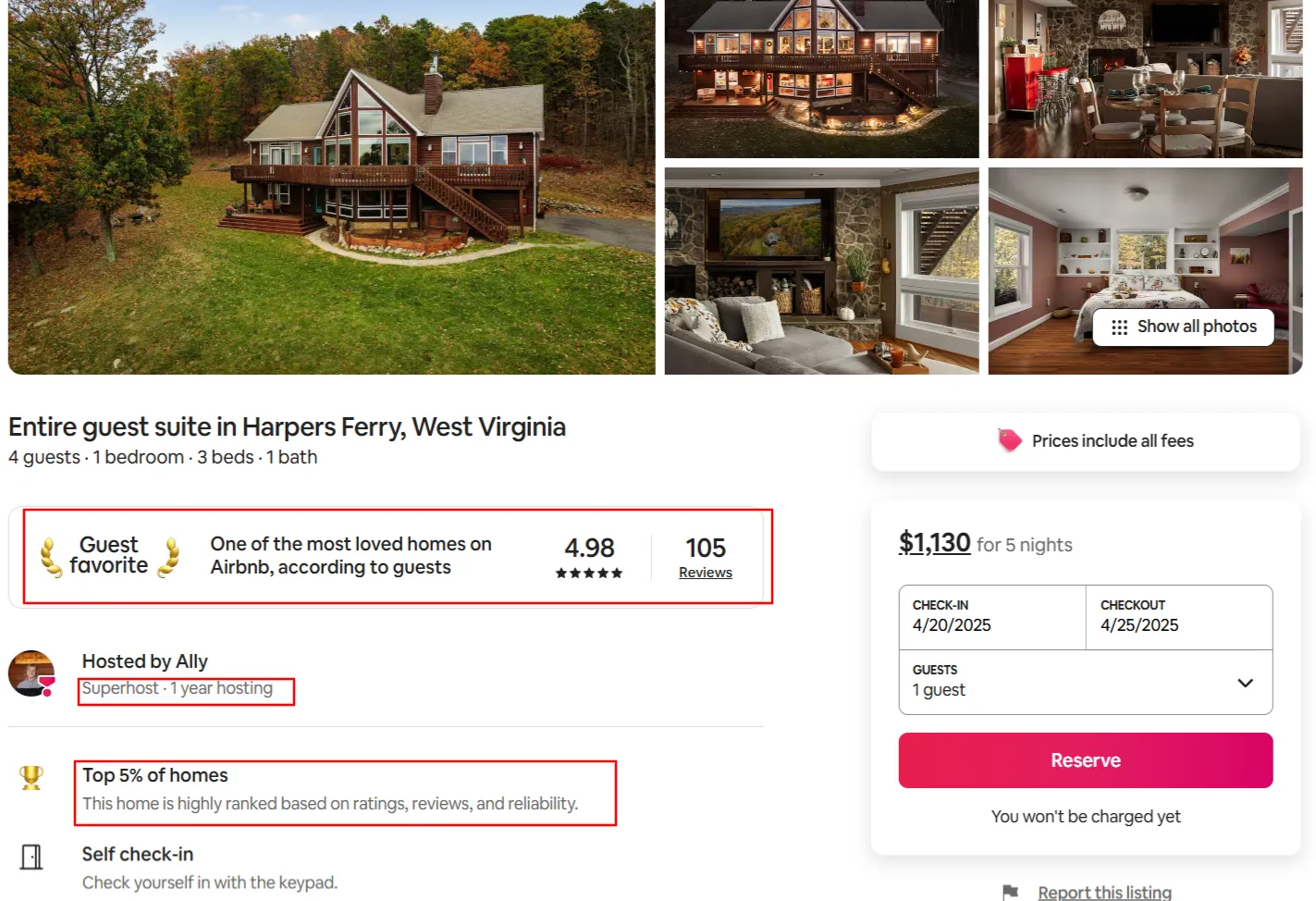
Unique Features
- Two-Way Review System: Both hosts and guests can review each other, fostering a transparent and trustworthy community. Reviews are submitted within a 14-day post-checkout period and published simultaneously to ensure unbiased feedback.
- Superhost Program: Recognizes hosts who provide exceptional hospitality, offering increased visibility and exclusive benefits.
- Co-Host Network: Introduced in October 2024, this feature allows hosts to find and collaborate with co-hosts to manage listings, enhancing the hosting experience.
Pros
- Show best qualities: Allows you to showcase unique aspects of your property (e.g., local experiences, distinctive design).
- Global reach: Access to a vast international audience seeking diverse and unique accommodations.
- Verified reviews: Only guests who have completed a stay can leave a review, ensuring authenticity and reliability. Reviews are typically detailed and focus on personalized guest experiences.
Cons
- Strict Rating Standards: The platform’s rating system is stringent; for instance, an overall rating below 4.5 stars can lead to host removal. This can be challenging, as even a 4-star rating may indicate guest dissatisfaction.
- High Commission: Airbnb takes a commission on bookings, and they have strict policies that hosts need to follow.
6. Yelp: Important for Boutique Hotels & Local Stays (USA-Focused)
Yelp is a go-to platform for travelers looking for unique, locally-owned stays in the USA. Boutique hotels benefit from their strong local search presence and detailed guest reviews.
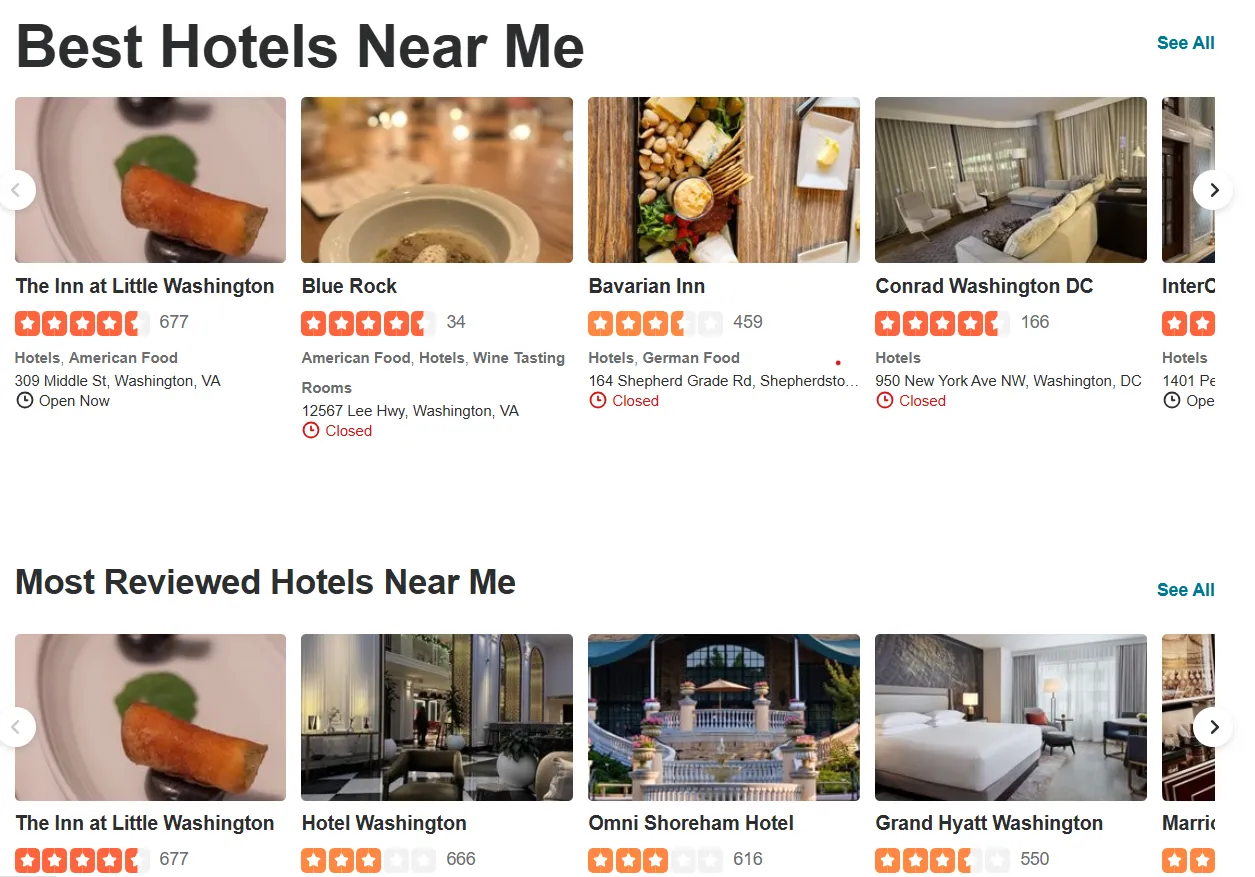
Unique Features
- Local business focus for niche visibility.
- Interactive profiles with photos and amenities.
- Direct guest-business engagement through responses.
Pros
- Strong local visibility for independent hotels.
- Helps build trust through guest feedback.
- Free to list, with options for paid promotions.
Cons
- High commission fees (typically 15-25%).
- Less direct engagement with guests compared to other platforms.
- Heavy discounting can impact profit margins.
7. Expedia & Hotels.com: Best for Budget & Mid-Range Hotels
Expedia and Hotels.com are top booking platforms for budget and mid-range hotels, offering massive exposure to travelers looking for affordable yet quality stays.
With over 47 million monthly users, these sites help hotels fill rooms quickly, especially during off-peak seasons. They are also integrated with meta hotel search engines, providing last-minute bookings and a comparison advantage through third-party hotel review platforms.
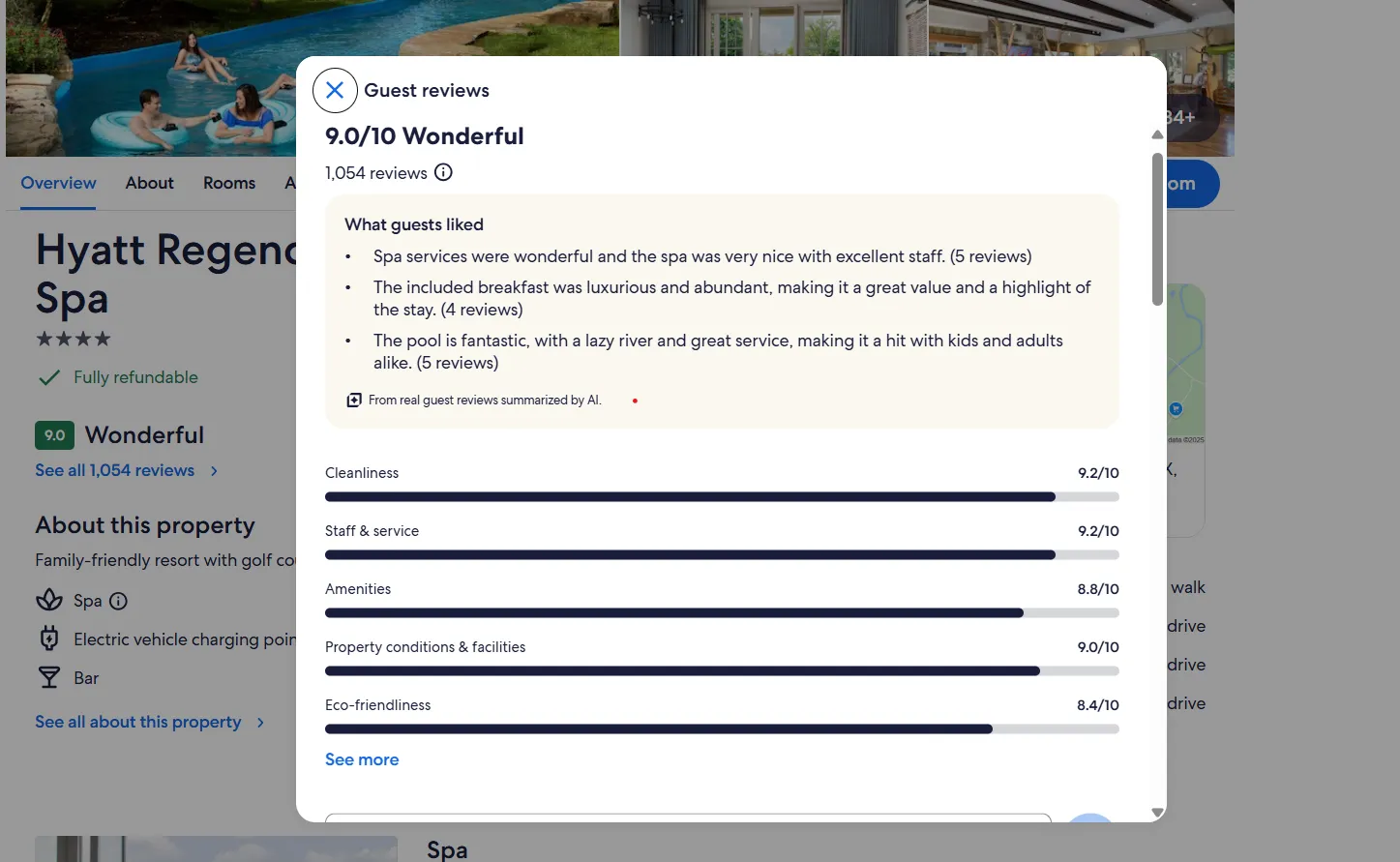
Why Hotels List Here?
- Massive Reach: Expedia attracts millions of global travelers searching for accommodations.
- Hotels.com Rewards: Encourages repeat bookings by offering free nights to loyal guests.
- Bundled Deals: Hotels benefit from package bookings with flights and car rentals.
Pros
- High visibility for hotels targeting budget and business travelers.
- Verified guest reviews boost credibility and trust, and hotels can send a review request using third-party tools.
- Marketing tools help optimize pricing and promotions.
Cons
- High commission fees (15-25%) cut into profits.
- Less direct interaction with guests compared to other platforms.
- Heavy discounting may reduce perceived value.
8. Oyster.com: In-Depth Hotel Reviews
Oyster.com sets itself apart by offering detailed, professional reviews of hotels, making it a valuable hotel review platform for accommodations that want to showcase their authenticity.
Unlike guest-driven review sites, Oyster sends professional reviewers to inspect properties, ensuring accurate, unbiased feedback.
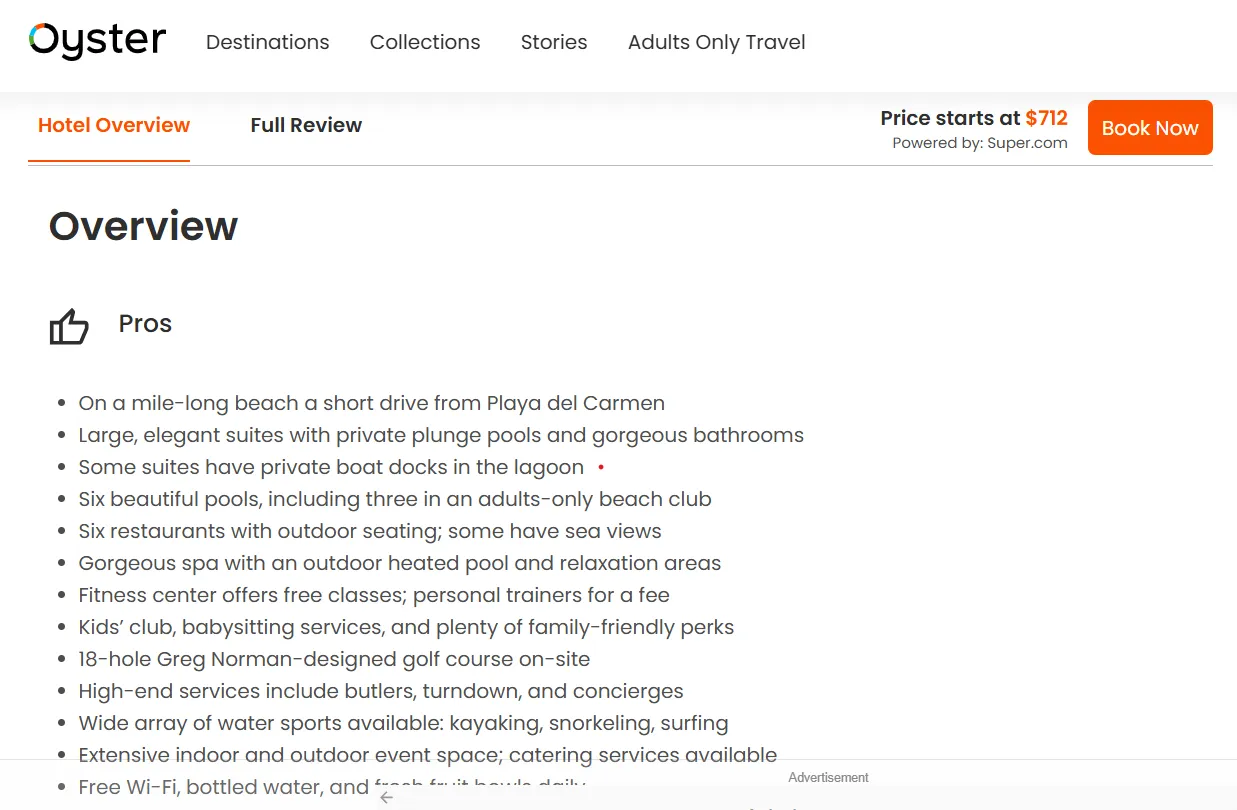
Unique Features
- Expert-Verified Reviews: Professional inspectors evaluate properties, reducing fake reviews.
- High-Quality Photos & Reports: Real, unfiltered images and in-depth analysis build guest trust.
- Strong Credibility: Part of TripAdvisor, boosting authority and reach.
Pros
- Detailed, professional reviews help build trust.
- Authentic photos prevent misleading expectations.
- Ideal for hotels wanting credibility over volume.
Cons
- Not open for public guest reviews—limited volume of feedback.
- Hotels can’t directly control content or influence ratings.
- Focuses mostly on mid-to-luxury properties, limiting budget hotel exposure.
9. Trivago: Best for Price Comparisons & Ratings
Trivago isn’t just a hotel review site, it’s a powerful meta-search engine that helps travelers compare hotel prices across multiple booking platforms.
If your hotel is listed on sites like Booking.com, Expedia, or Agoda, it’s likely already visible on Trivago. Optimizing your listing here can help attract more direct bookings.
Why should hotels list on Trivago?
- Price Comparison Tool: Guests see different rates from various booking sites in one place.
- Trivago Business Studio: Hotels can enhance their profiles with descriptions, images, and direct booking links.
- Review Aggregation: Trivago pulls ratings from multiple sites to create a comprehensive score.
Pros
- Increases visibility by showcasing prices across platforms.
- Helps hotels drive direct bookings with Trivago Business Studio.
- Displays ratings from multiple sources, giving a well-rounded reputation.
Cons
- Guests book through third-party sites, not directly with the hotel.
- Paid advertising is often needed for better ranking.
- Price-focused travelers may choose based on cost rather than experience.
With billions of users, Facebook isn’t just a social media platform—it’s a powerful social review site where travelers check ratings, read guest experiences, and even book stays. A strong presence here helps hotels build trust and engage directly with potential guests.
Why do hotels use Facebook reviews?
- Social Proof: Travelers often trust recommendations from friends and family.
- Direct Guest Engagement: Respond to reviews and messages in real time.
- Boosts Visibility: Positive reviews improve search rankings on Facebook and Google.
Pros
- Free and easy to manage for hotels of all sizes.
- Reviews appear alongside business updates, increasing credibility.
- Direct messaging allows for instant guest communication.
Cons
- Open review system, anyone can leave feedback, including non-guests.
- Negative reviews are highly visible and can impact reputation.
- Requires active management to respond and engage effectively.
11. Agoda: Popular for Discounted Stays
Agoda is a top hotel review website for budget travelers looking for substantial discounts on hotels, hostels, and alternative accommodations.
Even though extensively utilized in Asia, it has gained a substantial footprint in the USA and Europe today, which means it can be a worthwhile listing opportunity for accommodation businesses interested in drawing in overseas visitors.
Why Hotels Use Agoda?
- Strong Deals & Discounts: It helps attract budget-conscious travelers looking for the best rates.
- Run Special Offers: On this platfrom hotels can set up promotions to boost visibility with various third-party hotel review sites and booking platforms.
- Expanding Market: A great option for hotels targeting Asian and global travelers.
Pros
- High exposure to international guests.
- Offers marketing tools to increase direct bookings.
- Agoda’s loyalty program encourages repeat stays.
Cons
- Heavy discounting may lower profit margins.
- Commission fees can be high, depending on the property type.
- Less brand recognition in the USA compared to Booking.com or Expedia.
12. Trip.com: A Convenient Booking Platform
Trip.com is among the leading travel booking sites that stand among the fastest-growing platforms, serving travelers from across the globe.
Being a site with a smooth booking process, Trip.com is a good travel review website for hotels to attract foreign visitors, especially from China.
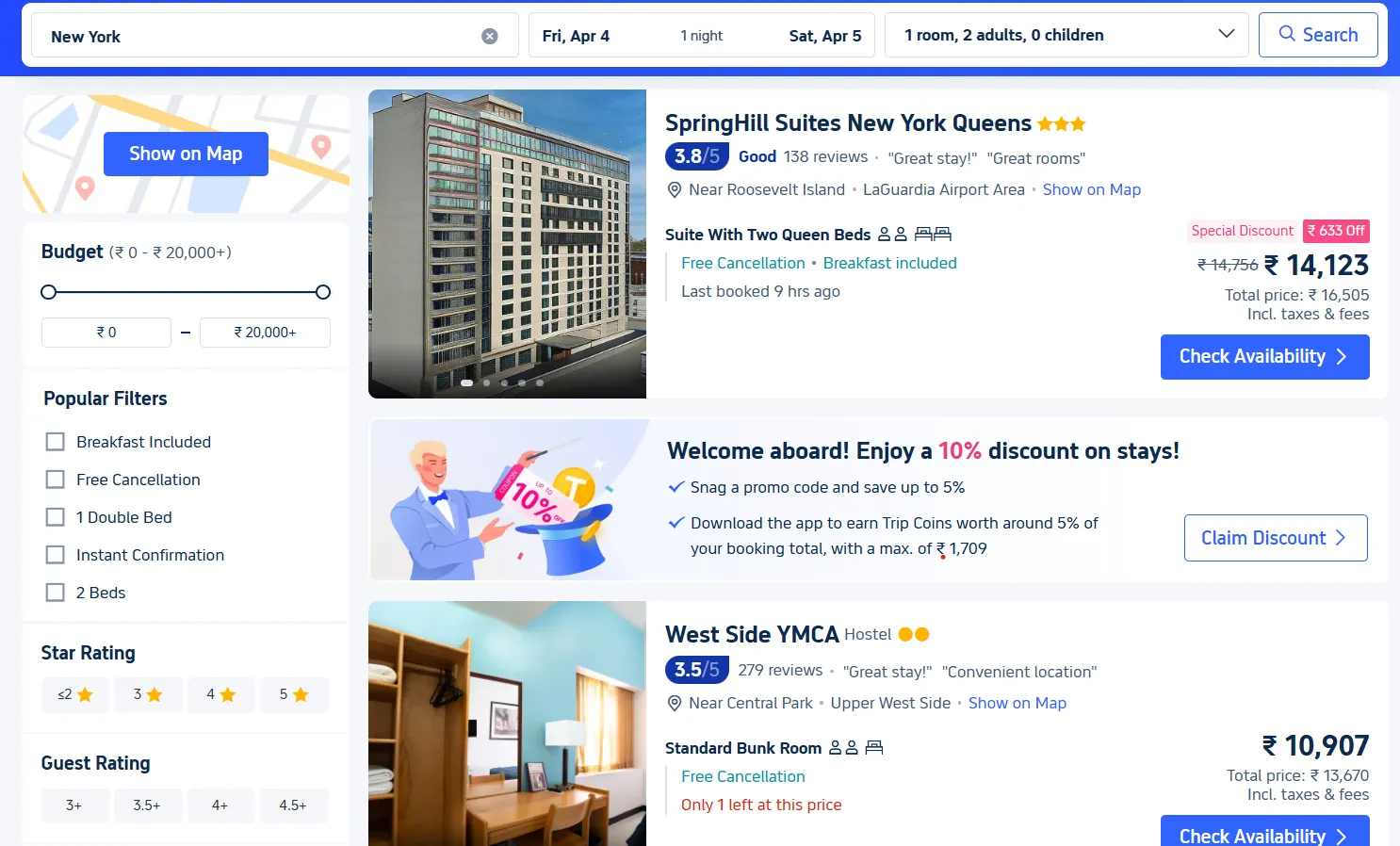
Why Hotels Use Trip.com?
- Strong in the Asian Market: A top choice for Chinese and international travelers.
- Multi-Service Platform: Offers hotel bookings, flights, and travel packages in one place.
- AI-Powered Recommendations: Helps hotels reach the right audience based on travel trends.
Pros
- Expanding global presence, especially in Asia and Europe.
- Attracts both budget and luxury travelers.
- User-friendly platform with multilingual support.
Cons
- High competition among hotels for visibility.
- Commission fees vary and can be on the higher side.
- Less popular in the USA compared to Booking.com or TripAdvisor.
13. Skyscanner.com: Best for European Travelers & Price Comparisons
Skyscanner began as famous for its airfare comparisons, but more recently, it’s grown to include hotel booking, and therefore, it’s a prominent hotel review website for motels looking to entice cost-cutting and repeat travelers.
It brings together hotel listings from more than one online travel agency (Agoda, Trip.com, Expedia, and TripAdvisor) so visitors can find the best deals in one place.
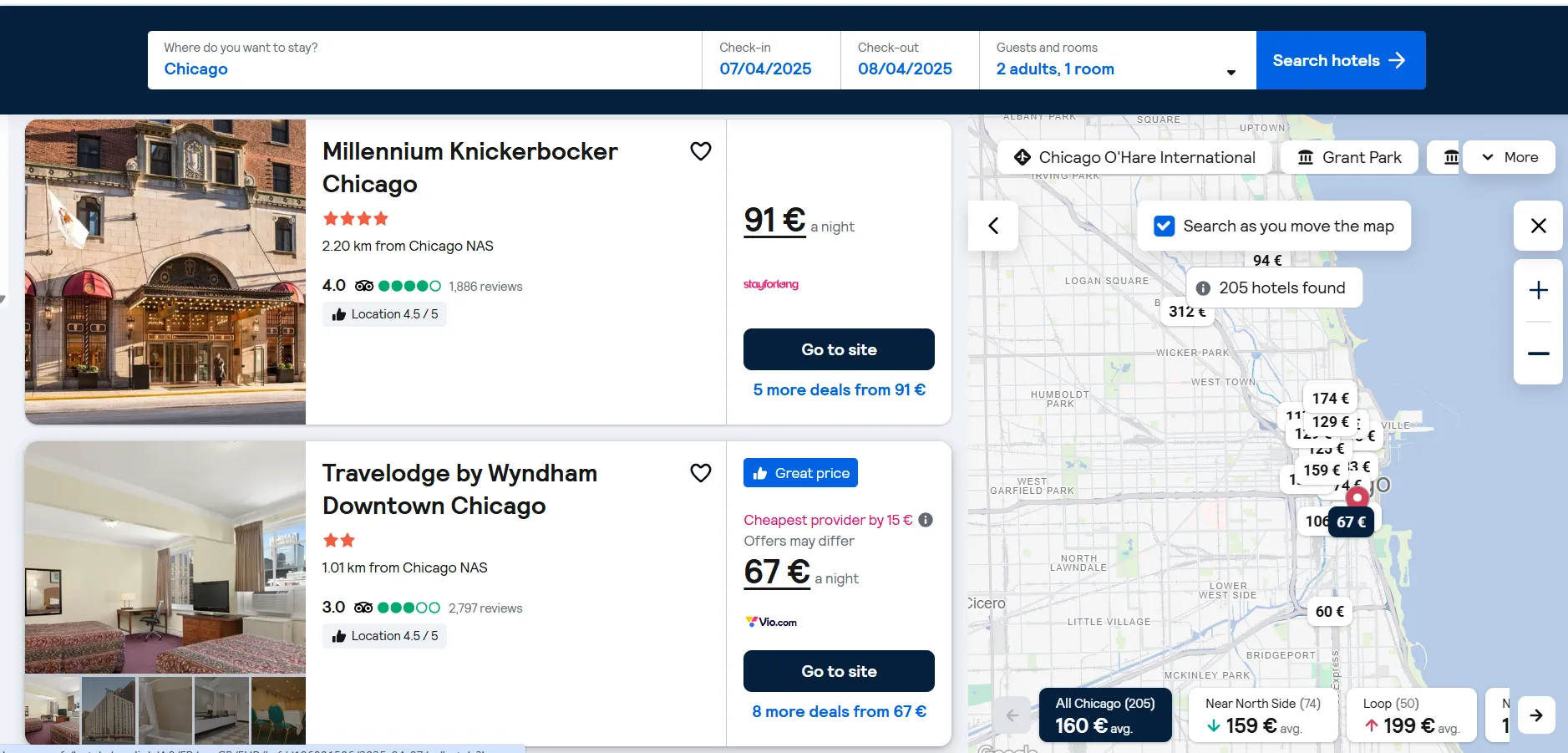
Why Hotels Use Skyscanner?
- Price Comparison Tool: Helps guests find the best hotel rates across multiple booking sites.
- Global Reach: Popular among travelers in Europe and North America.
- Seamless Mobile Experience: A go-to platform for travelers booking on the move.
Pros
- Increases visibility by showing price comparisons across platforms.
- Strong mobile and app presence for last-minute bookings.
- Helps hotels attract deal-seeking travelers.
Cons
- Hotels can’t list directly; they must work through OTAs.
- Competitive pricing means hotels may have to offer discounts.
- Less focus on guest reviews compared to TripAdvisor or Google Reviews.
14. Momondo.com: Great for Multi-Platform Searches
Momondo is a meta-search engine that helps travelers compare hotel prices across multiple booking sites, much like Skyscanner and Trivago. It’s popular in Europe and North America among price-sensitive travelers looking for the best deals on hotel rooms or a low-priced inn.
Why Hotels Use Momondo?
- Aggregates Prices: Pulls rates from different OTAs, helping guests find the best deals.
- Strong European Presence: Popular among budget-conscious travelers in Europe and the USA.
- No Direct Listings: Hotels appear on Momondo via platforms like Booking.com, Expedia, and Agoda.
Pros
- Expands visibility by listing your hotel across multiple OTAs.
- Attracts deal-seeking travelers looking for competitive pricing.
- Helps hotels optimize pricing strategies based on market trends.
Cons
- Hotels can’t list directly; they need an OTA partner.
- Heavy price competition can reduce profit margins.
- Focused more on price than guest experience or reviews.
15. OYO: A Fast-Growing Hotel Network & Booking Platform
OYO is among the most rapidly growing resort and hotel listing websites in the USA and Europe, buying essential hospitality companies to reinforce its base.
Unlike most review sites, OYO exists both as a hotel aggregator as well as a booking website, empowering independent hotels and budget properties to enhance their brand, room occupancy, as well as user experience.
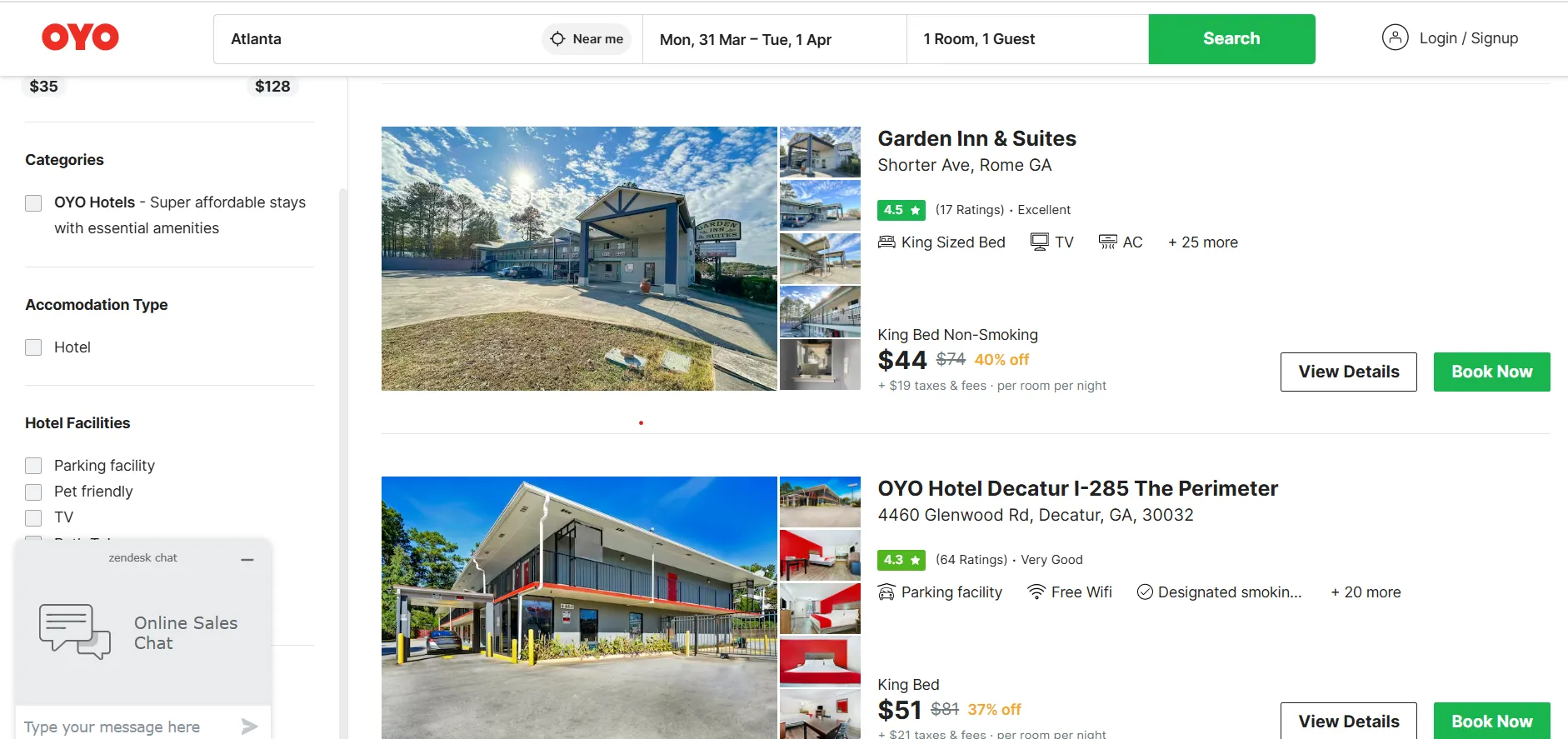
Why should hotels list on the OYO network?
- Major Growth in the USA & Europe: Acquired Motel 6 (G6 Hospitality), Checkmyguest, Bornholmske Feriehuse, and Direct Booker.
- Tech-Driven Revenue Management: AI-based pricing and occupancy optimization.
- OYO Branding Benefits: Partner hotels receive marketing support and standardized quality guidelines.
- Franchise & Partner Model: Hotels join OYO’s network while maintaining their operations. Best if you own a vacation rental property in Europe and the USA.
- Guest Loyalty & Rewards: Frequent travelers can access discounts through OYO’s rewards system.
Pros
- Increased visibility through OYO’s global network.
- Revenue management tools to maximize profits.
- Standardized quality assurance attracts more travelers.
- Best if you’re attracting Indian and other Asian travelers.
Cons
- Hotels must comply with OYO’s operational standards and branding.
- Commission fees apply, affecting direct profits.
16. Vrbo: A Trusted Review Platform for Private Vacation Stays
Vrbo is a go-to hotel review website for hotels, resorts, and vacation rentals offering private accommodations. Guests leave verified ratings on cleanliness, location, and overall experience, helping properties build credibility.
Popular in the USA and Europe, Vrbo attracts families and group travelers looking for private, comfortable stays, making it a valuable platform for properties offering suites, villas, or extended stays.
Unique Features
- Verified guest reviews—only travelers who have completed a stay can leave feedback.
- Focus on entire properties, making it ideal for hotels with private accommodations.
- Attracts family and group travelers looking for extended stays.
Pros
- Reviews help boost credibility and improve booking rates.
- Less competition from budget hostels and shared accommodations.
- A trusted platform in the USA and European vacation markets.
Cons
- Not ideal for hotels with dorms or shared spaces.
- Listing and management require active engagement from property owners.
- Service fees apply, reducing net revenue.
17. HomeToGo: A Growing Review & Booking Platform for Vacation Stays
HomeToGo is not just a meta-search engine anymore, it also allows travelers to book directly and leave reviews for their stays. While it primarily focuses on vacation rentals, boutique hotels and alternative accommodations can benefit from its growing audience in the USA and Europe.
Unique Features
- Direct user reviews—travelers can rate and review their stay directly on HomeToGo.
- Comparison across 17+ platforms like Vrbo, Booking.com, and Expedia.
- Great for alternative stays, extended stays, and unique boutique hotels.
Pros
- HomeToGo reviews add credibility and influence on traveler decisions.
- Offers direct bookings in addition to comparing external listings.
- A strong audience in the USA & Europe, especially for vacation destinations.
Cons
- Less visibility for traditional hotels compared to vacation rentals.
- Hotels must list through partner platforms or HomeToGo’s Direct Booking program.
- Smaller review base compared to giants like TripAdvisor and Google.
Manage Online Customer Feedback Across Hotel Review Sites Like a Pro
Managing reviews across different review sites doesn’t have to be overwhelming. Here’s how you can stay on top of your online reputation and make reviews work for your business:
Monitor Reviews Daily – Stay Ahead of the Game
Imagine waking up to a great review from a happy guest—awesome, right?
Now, what if a guest had a bad experience and left a negative review? If you don’t check regularly, you might miss the chance to fix it.
Reviewing feedback daily helps you respond quickly to both praise and complaints. Using a review management tool makes this easier by collecting all your reviews in one place.
Respond to All Reviews – Show You Care
You know how much a “Thank you” can brighten someone’s day. Well, so does a personal response to a review. Thank guests for their kind words and let them know you’ll address any issues raised.
For example, if a guest mentions the pillows weren’t comfortable, respond with: “We’re sorry about the pillows! We’ll be upgrading them soon.”
It shows you’re listening and care about improving.
Encourage Happy Guests to Leave Reviews
Most guests don’t think about leaving a review themselves, even if they had a great experience. A gentle reminder at checkout can make a huge difference.
For example, “If you enjoyed your stay, we’d love it if you could share your experience on TripAdvisor!”
Easy, right? This small “ask for review” can boost your online reputation and get more positive feedback online.
Use Review Management Software
Trying to check every site for reviews can be a headache. Instead, use review management software to keep track of feedback from Google, Booking.com, and more, all in one place.
It saves you time and makes sure you never miss a review, whether it’s a 5-star or a 1-star. Think of it like having a personal assistant handling reviews for you.
Managing reviews across multiple platforms can be a hassle, but SocialPilot Reviews makes it effortless. With AI-powered automation and centralized review tracking, you can stay on top of guest feedback without the manual work.
- Review Request Campaigns: Request reviews from guests’ post-checkout to boost your ratings on hotel review platforms.
- Automated Review Responses Using AI: Save time with AI-generated responses tailored to each review, in real time without delay.
- Centralized Review Management: Track and respond to reviews from Google, TripAdvisor, Booking.com, and more in one place.
Leverage Positive Reviews for Marketing
Positive feedback isn’t nice to read only, it’s a chance of free review marketing. Put out those 5-star reviews on your site, social media, email newsletters, and on other online and printed marketing materials.
If a guest praises your breakfast, share that review on your Instagram with a photo of your breakfast spread.
It provides potential visitors with a preview of what they are going to see and enhances your reputation.
Conclusion
In 2025, travelers will rely more than ever on what others say about your property before making a booking. If you actively monitor reviews, respond thoughtfully, and use them to market your business, you’re already ahead of the competition.
Happy customers are your best marketers. Managing your reviews effectively can improve bookings, visibility, and help your business develop. Whether you own a cozy hostel or a boutique hotel, prioritizing reviews will improve your internet profile.
Now, it’s time to take action. Start managing your feedback across hotel review sites with SocialPilot Reviews like a pro, and turn your guest feedback into your most powerful marketing tool.
